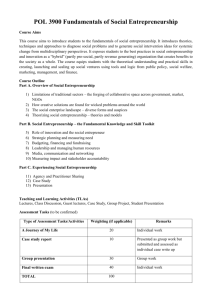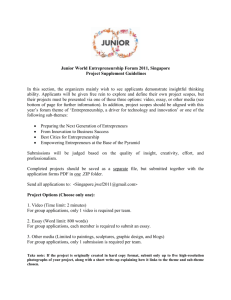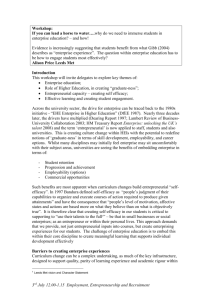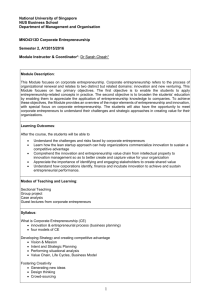Enterprising Cultures - University of Warwick
advertisement
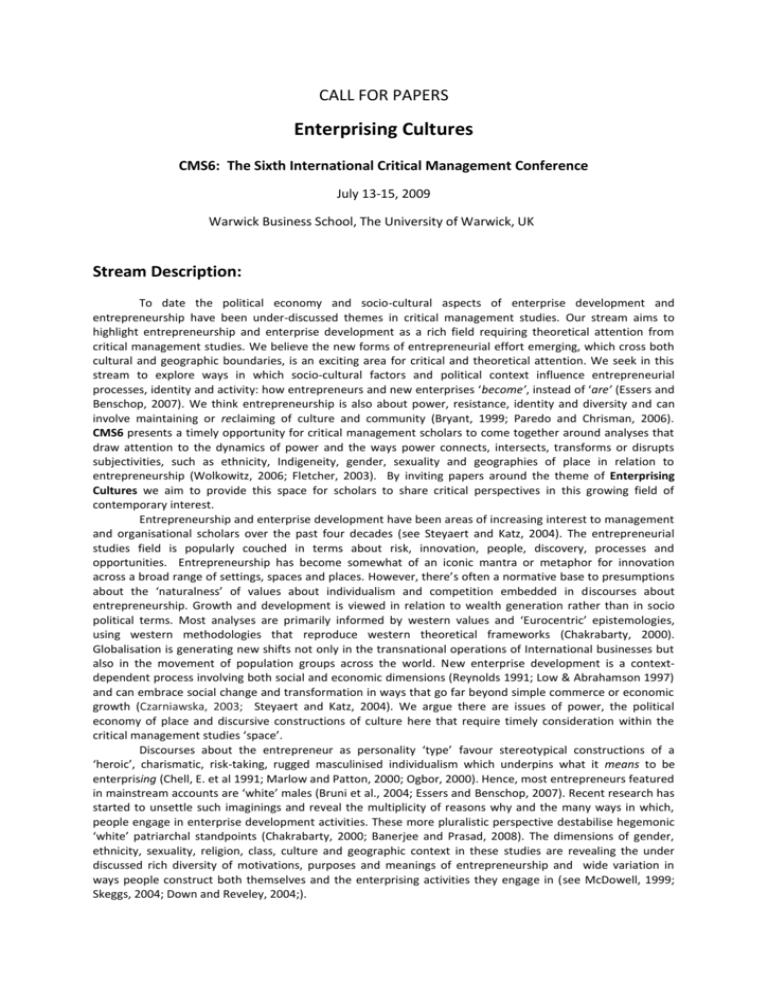
CALL FOR PAPERS Enterprising Cultures CMS6: The Sixth International Critical Management Conference July 13-15, 2009 Warwick Business School, The University of Warwick, UK Stream Description: To date the political economy and socio-cultural aspects of enterprise development and entrepreneurship have been under-discussed themes in critical management studies. Our stream aims to highlight entrepreneurship and enterprise development as a rich field requiring theoretical attention from critical management studies. We believe the new forms of entrepreneurial effort emerging, which cross both cultural and geographic boundaries, is an exciting area for critical and theoretical attention. We seek in this stream to explore ways in which socio-cultural factors and political context influence entrepreneurial processes, identity and activity: how entrepreneurs and new enterprises ‘become’, instead of ‘are’ (Essers and Benschop, 2007). We think entrepreneurship is also about power, resistance, identity and diversity and can involve maintaining or reclaiming of culture and community (Bryant, 1999; Paredo and Chrisman, 2006). CMS6 presents a timely opportunity for critical management scholars to come together around analyses that draw attention to the dynamics of power and the ways power connects, intersects, transforms or disrupts subjectivities, such as ethnicity, Indigeneity, gender, sexuality and geographies of place in relation to entrepreneurship (Wolkowitz, 2006; Fletcher, 2003). By inviting papers around the theme of Enterprising Cultures we aim to provide this space for scholars to share critical perspectives in this growing field of contemporary interest. Entrepreneurship and enterprise development have been areas of increasing interest to management and organisational scholars over the past four decades (see Steyaert and Katz, 2004). The entrepreneurial studies field is popularly couched in terms about risk, innovation, people, discovery, processes and opportunities. Entrepreneurship has become somewhat of an iconic mantra or metaphor for innovation across a broad range of settings, spaces and places. However, there’s often a normative base to presumptions about the ‘naturalness’ of values about individualism and competition embedded in discourses about entrepreneurship. Growth and development is viewed in relation to wealth generation rather than in socio political terms. Most analyses are primarily informed by western values and ‘Eurocentric’ epistemologies, using western methodologies that reproduce western theoretical frameworks (Chakrabarty, 2000). Globalisation is generating new shifts not only in the transnational operations of International businesses but also in the movement of population groups across the world. New enterprise development is a contextdependent process involving both social and economic dimensions (Reynolds 1991; Low & Abrahamson 1997) and can embrace social change and transformation in ways that go far beyond simple commerce or economic growth (Czarniawska, 2003; Steyaert and Katz, 2004). We argue there are issues of power, the political economy of place and discursive constructions of culture here that require timely consideration within the critical management studies ‘space’. Discourses about the entrepreneur as personality ‘type’ favour stereotypical constructions of a ‘heroic’, charismatic, risk-taking, rugged masculinised individualism which underpins what it means to be enterprising (Chell, E. et al 1991; Marlow and Patton, 2000; Ogbor, 2000). Hence, most entrepreneurs featured in mainstream accounts are ‘white’ males (Bruni et al., 2004; Essers and Benschop, 2007). Recent research has started to unsettle such imaginings and reveal the multiplicity of reasons why and the many ways in which, people engage in enterprise development activities. These more pluralistic perspective destabilise hegemonic ‘white’ patriarchal standpoints (Chakrabarty, 2000; Banerjee and Prasad, 2008). The dimensions of gender, ethnicity, sexuality, religion, class, culture and geographic context in these studies are revealing the under discussed rich diversity of motivations, purposes and meanings of entrepreneurship and wide variation in ways people construct both themselves and the enterprising activities they engage in (see McDowell, 1999; Skeggs, 2004; Down and Reveley, 2004;). Recent studies explore how ethnic minority and Indigenous entrepreneurs often rely on cultural networks of shared language, family relationships and the accumulation and exchange of communal social capital, to reveal how social and cultural factors play an essential role in defining not only the nature of the enterprise activity itself, but also in shaping governance and management arrangements (see for example: Anderson and Jack, 2002; Portes et al. 2002; Rehn and Talaas, 2004; Peredo, et al, 2004; Pio, 2005; Frederick and Foley, 2006; Lee-Ross and Mitchell, 2007; Bruton et al; 2008; Cahn, 2008; Banerjee and Tedmanson, 2007). In developing third and fourth worlds entrepreneurial activity leads to enterprise development which builds not only capacity but resilience against externally imposed, often colonially driven oppressions of the past. A postcolonial perspective would analyse minority entrepreneurship and community enterprise development as part of the ways ‘subaltern’ groups can ‘speak back’ (Spivak, 1988) against the historic legacies of past and continuing (neo) colonial dominations (Frenkel and Shenav, 2003; Storr and Butkevich, 2007; Banerjee and Tedmanson, 2007). We envisage strong interest in CMS6 Stream: Enterprising Cultures from scholars concerned with questions of class, political economy, post-colonialism, gender, sexuality, development studies and Indigenous enterprise development. We welcome practice based and theory presentations which deconstruct mainstream ideologies in this field and address questions such as: How do ‘mainstream’ entrepreneurial discourses both constrain and enhance enterprising cultures? How do the dynamics of power, gender, resistance, sexuality, identity, space, emotions, ethnicity interplay to shape (or be shaped by) entrepreneurial activity? In what ways does culture shape entrepreneurial activity and/or its organizational form? Do emergent ‘minority’ enterprises generate new hybridities of cultural and social entrepreneuring in either developing or ‘host’ nation contexts? We call for papers that address these questions and/or explore the following themes: Socio-cultural dynamics of entrepreneurship Entrepreneurial ‘identities’: the entrepreneurial ‘others’ The political economy of local enterprise development Socio cultural factors in entrepreneurial activities Geographies of entrepreneurship Issues of: gender, class, ethnicity, locality, Indigeneity, sexuality – in enterprise activity, organisation and management Critical reflections on management and power relations in enterprise development and/or entrepreneurship – including insights drawn from: o feminist theory; o postcolonial theory; o ‘whiteness’ theory; o cultural perspectives; o action research; narratives; story telling; discourse analysis or other innovative perspectives Stream Convenors: Deirdre Tedmanson deirdre.tedmanson@unisa.edu.au University of South Australia +61 43 999 0889 Caroline Essers c.essers@fm.ru.nl Radboud University Nijmegen +31-24 3611740 Lia Bryant lia.bryant@unisa.edu.au University of South Australia +61 8 830 24363 Key Dates: 1st November 2008 Submit Abstracts (<1000 words, A4, single spaced, 12 point font) to: deirdre.tedmanson@unisa.edu.au 31st December 2008 Notification of selection 1st May 2009 Full papers submitted References Anderson, R. (2002). Entrepreneurship and Aboriginal Canadians: A case study in economic development. Journal of Development Entrepreneurship, 7(1): 45-66. Anderson, A.R., & Jack, S.L. 2002. The articulation of social capital in entrepreneurial networks: A glue or lubricant? Entrepreneurship and Regional Development, 14: 193Banerjee, S.B. & Tedmanson, D (2007) ‘Grass Burning Under our Feet: Indigenous Enterprise Development in a Political Economy of Whiteness’, Paper delivered 5th CMS Conference, Manchester. Banerjee, S.B. & Prasad , A. (2008) (forthcoming) Special edition editorial comments, Special Edition: Postcolonial Perspectives, Critical Perspectives in International Business. Bruni, A., Gherardi, S. and Poggio, B. (2004). Doing Gender, Doing Entrepreneurship: An Ethnographic Account of Intertwined Practices. Gender, Work and Organization, 11(4), 406-429. Bruton, G, Ahlstrom, D & Obloj, K. ( 2008) Entrepreneurship in Emerging Economies: Where Are We Today and Where Should the Research Go in the Future, Entrepreneurship Theory & Practice, 1-14. Bryant, L (1999). The detraditionalisation of occupational identities, Sociologia Ruralis, 39, 2, 236-261. Cahn, M. (2008). Indigenous entrepreneurship, culture and micro-enterprise in the Pacific Islands: case studies from Samoa, Entrepreneurship & Regional Development 20, JANUARY (2008), 1–18 Chakrabarty, D. (2000). Provincializing Europe: Postcolonial Thought , Princeton University Press, Princeton. Chell, E., Haworth, J. & Brealey, S. (1991). The Entrepreneurial Personality, Routledge, London. Chell, E. (2000). Towards researching the ‘opportunistic entrepreneur’: a social constructionist approach and research agenda, European Journal of Work and Organizational Psychology, 9: 63–80. Clydesdale, G. (2007). Maori Cultural evolution and economic growth: New Zealand, Entrepreneurship & Regional Development, 19, January, 49–68 Czarniawska, B. (2003). ‘Social constructionism and organization studies’, in Westwood, R. and Clegg, S. (eds), Debating Organization Point-Counterpoint in Organization Studies (Oxford: Blackwell) Down, S & Reveley, J (2004). Generational Encounters and the Social Formation of Entrepreneurial Identity: 'Young Guns' and 'Old Farts', Organization, Vol. 11, No. 2, 233-250 Du Gay, P. (1996) Consumption and Identity at Work. Sage, London Essers, C. and Benschop, Y. (2007) Enterprising Identities: Female Entrepreneurs of Moroccan and Turkish Origin in the Netherlands. Organization Studies, 28, 1, 49-69. Fletcher, D. E. (2003) Framing organisational emergence: discourse, identity and relationship, in Steyaert, C. and Hjorth, D. (eds), New Movements in Entreprneurship , Edward Elgar, Northampton, UK. Frederick , H. & Foley, D. (2006) Indigenous Populations as Disadvantaged Entrepreneurs in Australia and New Zealand The International Indigenous Journal of Entrepreneurship, Advancement, Strategy and Education, Vol. 6, 2006. Frenkel, V. & Shenhav, Y. (2003). From Americanization to Colonization: The Diffusion of Productivity Models, Organization Studies, 24(9): 1537–1561 Lee-Ross , D. & Mitchell, B. ( 2007) . Doing Business in the Torres Strait Islands: Study of Relationship Between Culture & Nature of Indigenous Entrepreneurs, Journal of Developmental Entrepreneruship, 12; 2 199-216. Mapunda, G. (2005). Traditional Societies and Entrepreneurship: an analysis of Australian and Tanzanian Businesses, Journal of Asia Entrepreneurship and Sustainability, Vol. 1: 1, July, 2005. Marlow, S. & Patton, D. (2005). All credit to men? Entrepreneurship, finance, and gender. Entrepreneurship Theory and Practice, 29(6), 717–735. NcDade, B & Spring A (2005). The 'new generation of African entrepreneurs': networking to change the climate for business and private sector-led development, Entrepreneurship & Regional Development, Jan 17–42 McDowell, L. (1999). Gender, Identity and Place, Polity Press, Cambridge, U.K. McManus, P.A. (2001). Women’s participation in self-employment in western industrialized nations. International Journal of Sociology, 31(2), 70–97. Mirchandani, K. (1999). Feminist insight on gendered work: New directions in research on women andentrepreneurship. Gender, Work and Organization, 6(4), 224–235. Ogbor, J. (2000) Mythicising and reification in entrepreneurial discourse: ideology—critique of entrepreneurial studies, Journal of Management Studies, 37: 605–635. Peredo, A. M. & Chrisman, J. ( 2006). Toward a Theory of Community-Based Enterprise. Academy of Management Review, 31(2): 309-328. Peredo, A.M; Anderson, R; Galbraith, C; Honig B. &. Dana L.P (2004). Towards a theory of indigenous entrepreneurship I nt. J. Entrepreneurship and Small Business, Vol. 1, Nos. 1/2, 2004 Peterson ,M. & Meckler ,M. (2001) Cuban-American Entrepreneurs: Chance, Complexity and Chaos, Organization Studies 2001, 22/1 31-57 Petterson, K. (2005). Masculine entrepreneurship— Gnosjö discourse in feminist perspective. In Hjorth D & C. Steyaert (Eds.), Narrative and discursive approaches in entrepreneurship (pp. 177–193). Elgar.Cheltenham, U.K. Pio, E. (2005). Knotted strands: Working lives of Indian women migrants in New Zealand, Human Relations, 58(10), 1277-1300. Portes, A, William, & Guarnizo, L. (2002) ‘Transnational entrepreneurs: An alternative form of immigrant economic adaption’, American Sociological Review 67/4: 278–298. Rehn, A & Talaas, s. (2004) 'Znakomstva I Svyazi' (Acquaintances and connections) - Blat, the Soviet Union, & mundane entrepreneurship, Entrepreneurship & Regional Development 16, MAY 235 250 Reynolds P. (1991). Sociology and entrepreneurship, Entrepreneurship Theory Practice, 16(2): 47.70 Servon, L. J. (1997). Microenterprise programs in U.S. inner cities: Economic development or social welfare? Economic Development Quarterly, 11(2), 166-180.Skeggs, B. (2004). Class, Self, Culture. Routledge, London. Skeggs, B. (2004) Class, Self, Culture, Routledge, London. Spilling, O. ( 1991) Entrepreneurship in cultural perspective, Entrepreneurship & regional Development 3, 33-48 Spivak, G. (1988). ‘Can the Subaltern Speak?’ in Cary Nelson and Larry Grossberg, eds. Marxism and the interpretation of Culture. Uni of Illinois Press, Chicago, pps.271-313. Steyaert, C & Katz, J. (2004). Reclaiming the space of entrepreneurship in society: geographical, discursive and social dimensions, Entrepreneurship & Regional Development, 16, May, 179–196 Storr, V & Butkevich, B. (2007). Subalternity and Entrepreneurship: Tales of marginalized but enterprising characters, oppressive settings and haunting plots, Entrepreneurship and Innovation, Vol 8, No 4, pp 251–260 West,G; Bamford C & Marsden, J. (2008). Contrasting Entrepreneurial Economic Development in Emerging Latin American Economies: Applications and Extensions of Resource-Based Theory, Entrepreneurial Theory & Practice, January, 2008, 15-36. Wolkowitz, C. (2006) Bodies at Work, Sage, London.




